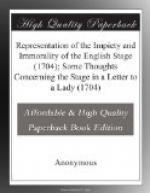And is not the dangerous and expensive War we are engaged in, together with the present Posture of Affairs, a sufficient Reason for this, tho’ the Play-Houses were less mischievous to the Nation than they are?
Are we not also loudly called upon to lay aside this prophane Diversion, by the late dreadful Storm, terrible beyond that which we are told was felt in the Year 1636? which, as a Right Reverend Prelate has observ’d, some good Men then thought presag’d further Calamity to this Nation, and was accordingly followed by the Commotions in Scotland the very next Year, and not long after by the Civil War in England.
And if we go on to countenance such open and flagrant Defiances of Almighty God, have we not great Reason to fear his heavy Judgments will consume us?
But further, Her Majesty having now, upon Occasion of the late great Calamity, appointed a Day of Solemn Fasting and Humiliation throughout the Kingdom, for the deprecating of God’s Wrath, surely the Players have little Reason to expect that they shall still go on in their abominable Outrages; who, ’tis to be observed with Indignation, did, as we are assured, within a few Days after we felt the late dreadful Storm, entertain their Audience with the ridiculous Representation of what had fill’d us with so great Horror in their Plays call’d ‘Mackbeth’ and the ‘Tempest’ as if they design’d to Mock the Almighty Power of God, who alone commands the Winds and the Seas, and they obey him. No surely, it cannot but be hoped, that a Suspension at least of the Players acting for some considerable time will follow, when the Prophaneness and Immorality of the Stage comes to Her Majesty’s Knowledge, who, ’tis to be remembred, has never once given any Countenance to the Play-House by Her Royal Presence, since Her happy Accession to the Throne.
The abominable obscene Expressions which so frequently occur in our Plays, as if the principal Design of them was to gratifie the lewd and vicious part of the Audience, and to corrupt the virtuously dispos’d, are in this black Collection wholly omitted; lest thereby fresh Poison should be administred instead of an Antidote.
After the Endeavours used by Sir Richard Blackmore, Mr. Collier, and others, to Correct and Reform the Scandalous Disorders and Abuses of the Stage_ were found too unsuccessful; in the Year 1699, several of the Players were prosecuted in the Court of Common-Pleas, upon the Statute of 3 Jac. 1. for prophanely using the Name of GOD upon the Stage, and Verdicts were obtained against them._
And in Easter-Term, 1701_, the Players of one House were Indicted at the King’s-Bench-Bar, before the Right Honourable the Lord Chief Justice Holt, for using these following Expressions, and were thereof Convicted._
In the Play call’d, The Provok’d Wife.__
’But more than all that, you must know I was afraid of being damn’d in those Days; for I kept sneaking, cowardly Company, Fellows that went to Church, and said Grace to their Meat, and had not the least Tincture of Quality about em.




